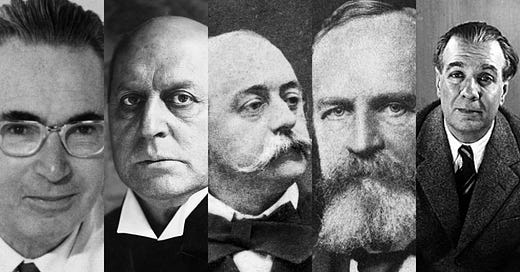✹ For today’s edition of Wisdom Letter, we have carefully curated five bite-sized quotes from brilliant thinkers such as Viktor Frankl and Henry James, each paired with a philosophical question designed to provoke deep reflection.
Quote № 01:
“An abnormal reaction to an abnormal situation is normal behavior.”
— Viktor Frankl (1905–1997), “Man's Search for Meaning”
~ Follow-up Question:
When the social or political environment becomes distorted or oppressive, to what extent is emotional or behavioral deviation not just inevitable but necessary for the preservation of one’s humanity and identity?
Quote № 02:
“True happiness, we are told, consists in getting out of one's self; but the point is not only to get out — you must stay out; and to stay out you must have some absorbing errand.”
— Henry James (1843–1916), “Roderick Hudson”
~ Follow-up Question:
If one’s sense of purpose is tethered to an “absorbing errand” beyond the self, what happens when that external pursuit ends, fails, or no longer fulfills—does happiness then prove to be fragile, conditional, or even illusory?
Quote № 03:
“Nothing is more humiliating than to see idiots succeed in enterprises we have failed in.”
— Gustave Flaubert (1821–1880), “Sentimental Education”
~ Follow-up Question:
Might the pain of witnessing another’s seemingly unearned victory stem less from envy than from the collapse of our internal narrative about competence and worth—and if so, how does one rebuild meaning in the face of that narrative’s unraveling?
Quote № 04:
“We are all ready to be savage in some cause. The difference between a good man and a bad one is the choice of the cause.”
— William James (1842–1910)
~ Follow-up Question:
How do we ethically evaluate individuals whose destructive actions stem from sincere devotion to what they believe is a just cause, and does intention ever absolve the consequences of moral extremism?
Quote № 05:
“Being with you and not being with you is the only way I have to measure time.”
— Jorge Luis Borges (1899–1986), “The Book of Sand”
~ Follow-up Question:
Is the pain of absence intensified by the memory of closeness, and does this duality—being with and without—create a kind of internal calendar that no external measure of time can truly replace?
✽ Thank you for reading today’s Wisdom Letter.
✺ Help Sustain Philosophors
If you’ve enjoyed this issue of Philosophors, consider supporting this one-person labor of love. My goal is to make wisdom more accessible for everyone—completely free of charge, with no ads or paywalls. Philosophors exists solely thanks to the generosity of readers like you. If you’re in a position to help, even a small donation makes a meaningful difference.
✦ Donate Here → buymeacoffee.com/philosophors
With gratitude,
Maze Heart, the curator of Philosophors



